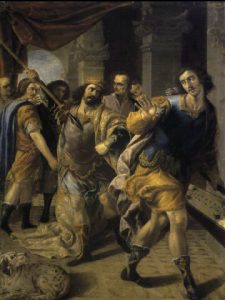The sermon text below on dealing with a crisis in your life is largely as preached at MacAlpine Presbyterian Church this morning. I’ve tried to add the gist of additions here and there from my notes and memory though I didn’t unpack all of the illustrations here and you’ll just have to listen to the audio to get the rest of the story. This was an emotional sermon for me to preach, which may more may not come across in the audio–nothing compares to being present for the sermon. The line with the strikethrough is the main point of that paragraph, but it was not spoken until where you see it in italics. New audio link.

Saul Threatening David by José Leonardo
All of us have experienced times when we were overwhelmed. The feeling may be the result of a huge crisis like being injured in an accident at work, or getting a cancer diagnosis, or realizing that you are losing your sight to glaucoma or your memory to dementia, or whenever a child dies before his parents. I know that several of you can personally identify with one of these huge crises, some even recently. But the crisis you face does not need to be that big to be overwhelming for you. For those who struggle with anxiety it can be overwhelming just to go out to the store alone or to go on a long trip. Even coming home from work and finding that what you thought was your sanctuary is in chaos may trigger an overwhelming crisis. The feeling of being overwhelmed by a crisis, big or small, is not to be dismissed lightly. Thankfully King David, who was no stranger to overwhelming crises, learned how to cope with these kinds of things and is ready to teach us, so listen to his response:
Psalm 131
Often we respond to overwhelming crises by asking heavy questions.
-
- We might ask: “What if I had done this instead?” I remember thinking after the death of my Grandmother while I was in seminary that I wish I had gone to see her before the end. I was planning to go visit soon, but did not make it in time. It is not that it would have made any difference in how long she lived, but I regretted not going to spend time with her then. And there are many plagued with guilt because you keep thinking that things would be different if you had been there or if you had done something else instead because you think it would have changed the outcome. You might think, ‘if only I had been driving instead of letting my child ride with a friend.’ (Illustration from a popular Christian movie.) Overwhelming crises often lead us to ask: What if I had done this instead?
- We might ask: “Why did God let this happen?” I remember thinking this when preparing a funeral for an infant who after living for nine months in his mother’s womb had died during birth. Many asked this same question in light of the school shooting at Sandy Hook Elementary School in Newtown, Connecticut where twenty children and six adults were murdered. (Illustration of 9-11 and the PRESENT major crisis: the Hurricane/flooding/tornadoes in Texas, especially the flooding of Houston.) And the more overwhelming and tragic the crisis is to us personally the more anger may accompany the question – Why God, why did you let this happen?
(transition: So we often respond to overwhelming crises by asking heavy questions and at some point we start asking: Now what can I do?)
- King David learned through experience not to dwell on the heavy questions but to respond by calming and quieting his soul.
- David’s heart at one time had been lifted up and he had been occupied with things too heavy for him. In his pride he thought that he knew better and could see better than God. This often leads to dwelling on the heavy questions. He certainly had gone through many things that would lead anyone to ask heavy questions of God. King Saul tried to kill David on more than one occasion, the Amalekites took David’s wives captive during a raid, David’s first child with Bathsheba became sick and died as an infant, and one of David’s sons killed another. In fact, this son Absalom conspired to overthrow King David. King David had been told that his son Absalom had killed all of the king’s sons and that not one of them was left. And David tore his clothes and laid down on the ground in mourning. Thankfully the rumor turned out not to be true and only his one son had been murdered. The rumor itself was enough to be an overwhelming crisis for any parent but certainly the murder of his one son, let alone the rebellion of another son, qualifies as an overwhelming crisis for any father. So you see that David experienced many of these throughout his life. Truly he was a man of sorrows who was acquainted with grief. And he knew what it was like to wonder, “What if I had done this instead?” He could have wondered what might have happened if he had only dealt with the situation that led Absalom to rebel. He could have wondered what might have happened if he had not committed adultery with Bathsheba and then had her husband Uriah the Hittite killed. And he could have wondered what might have happened if he had been there when the Amalekites invaded the city where his wives were staying. And he knew what it is like to wonder, “Why did God let this happen?” But he learned through experience not to dwell on the heavy questions but to respond by calming and quieting his soul.
- [
David learned to respond to the overwhelming crises of life by climbing up into the lap of God and letting God care for him.] David had wrestled with God over these kinds of heavy things but he grew to understand that the answers to such questions would not make things any better. In the face of crises that would overwhelm anyone, the only thing that helped David (as he tells us in verse 2) was to calm and quiet his soul like a weaned child with its mother. The young mothers here will tell you that the nursing child is always wanting to eat and will try to tear off mom’s shirt to get to the food – even in public. But when that process of weaning is complete the same child wants to sit in her mother’s lap and be held in her arms just because she wants her mom. She knows mom will provide whatever she needs. She is not concerned about feeding from mom anymore. She just wants to snuggle with mom. David had learned to become like a little child but not a nursing child fussing for what God can give him – he had become like a weaned child. A weaned child that would climb up into the lap of God and let Him care for little David. He did not want answers anymore. He just wanted God. So David learned to respond to the overwhelming crises of life by climbing up into the lap of God and letting God care for him.
(transition: David is a type of Jesus Christ, surely a man of sorrows acquainted with grief, fully human such that he learned by experience of crises, said, ‘take this cup from me, but not my will but yours be done’ and lived by faith and not by sight, and then died on the cross for our sins — the event that makes it possible for us to respond differently to crises. So we have seen what King David learned to do when he experienced an overwhelming crisis in his life (like Christ). How are we to respond to crises?)
- King David invites us (in verse 3) to join him and hope in the Lord now and forevermore. Thus you too are to respond to the overwhelming crises of life by climbing up into the lap of God and let Him care for you. When one of those overwhelming crises of life comes you might think that you would do things differently if you were God and that you can see better than He can. You may be tempted to dwell on the heavy questions like “What if?” and “Why?” You may even start asking, “What now?” You just want to do something. And there is something that you can do now that will help. You can learn as David did to respond to that overwhelming crisis like a little weaned child who just wants to sit in his mother’s lap. This is a response of faith where you just climb up into God’s lap and let Him care for you. You can join David and hope in the Lord. You can hope in the Lord not just until the heat of the crisis burns less hot, but from this time forth and forevermore. (This is not unlike Matthew 18 where Jesus says, “Truly I say to you, unless you turn (repent/change — they need to repent of the same thing as David (v.1) — context in Matthew 18 is the disciples’ question “Who is the greatest in the kingdom of heaven?”) and become like children you will never enter the kingdom of heaven. Whoever humbles himself like this child (context: he called a child and put the child in their midst, it was a weaned child) is the greatest in the kingdom of heaven.” Eternal life begins now and continues forevermore.)Time and again as a pastor I have witnessed many people respond to tragedy and to suffering by climbing up into God’s lap and sitting there just because they want to be with God and not because they just want something from him. This is what I’ve seen several people do in response to cancer. I had no doubt that they were growing in faith in the midst of the battle. It is obvious just listening to them talk. This is because when we sit in God’s lap we are resting (not working — not a good work that we do to be saved) and trusting and hoping. May you all respond to each of the overwhelming crises of your lives, even the ones that might seem small but are overwhelming you, by climbing up into God’s lap and letting Him care for you now and forevermore. Amen.

Recent Comments